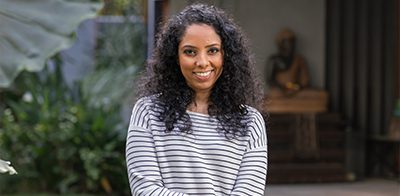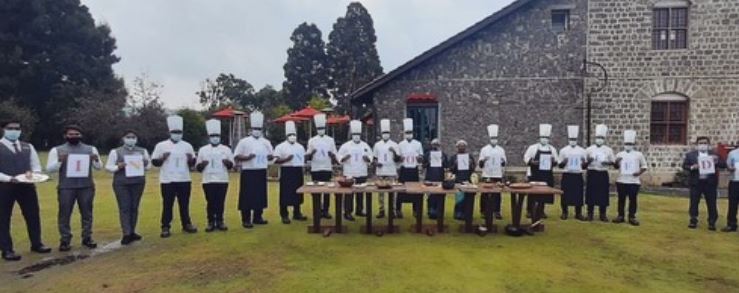(March 18, 2022) The hospitality sector has made a roaring return after two years of flagging demand caused by the pandemic. Experts call the boom “revenge tourism” with people flocking to holiday destinations to make up for lost time. The hospitality czarina, Shruti Shibulal, CEO, Tamara Leisure Experiences says their luxury properties in places like Coorg and Kodaikanal have certainly benefitted from the upswing. Shruti was introduced to Napoleon’s Glance at Colombia, University which added pertinent strategic goals to her life. That, and seeing her father, Infosys co-founder and former CEO SD Shibulal in throes of business has helped her gain a deep understanding of business and ethics.

Shruti Shibulal, CEO, Tamara Leisure Experiences
The age of the socially conscious traveller
“Our luxury segment benefitted from the rise of “revenge travel”. People were looking to exit urban spaces and find nature-centric escapes. Those within driving distance of our resorts in Coorg and Kodaikanal did just that,” Shruti says, in an exclusive with Global Indian. “These properties didn’t just bounce back, they hit pre-pandemic performance projections.” The hospitality czarina foresees the greatest growth, however, in the ‘O by Tamara’ brand. “We will slowly start to see the return of meetings, incentives, conferencing & exhibitions (MICE), which will fuel the return of business travel,” she adds.
The first two rounds of the pandemic and the lockdowns hugely impacted business. The third wave, however, was met with a newfound resilience and people seemed unwilling to let it dictate their choices. “There is a sense of wanting to move forward safely and cautiously,” Shruti remarks. “The pandemic has also given rise to the conscious traveller who seeks sustainable destinations, health-focused getaways and mindful experiences,” adds the hospitality czarina.
Finance to hospitality
The entrepreneur made her first foray into the F&B industry back in 2008, when she met chef Abhijit Saha in Bengaluru. Before that, growing up in a home where discussions of finance and technology made for dinner table chit-chat, pursuing a career in finance herself seemed something of a given. After she graduated from Haverford College in the US, Shruti began working with Merrill Lynch in New York until her return to India in 2007. By this time, she knew her calling lay in being able to think outside the box and build a business from the ground up.

After mulling this over for a while, a meeting with chef Abhijit Saha helped Shruti realise that hospitality was where she wanted to be. In 2009, the duo gave Bengaluru its first experience of molecular gastronomy with Caperberry, which offered high-end Mediterranean cuisine. Returning to the US for an MBA at Columbia University shortly after, she juggled her studies with her projects back home until the course ended in 2012.
View this post on Instagram
The world of luxury eco-travel
The Tamara Coorg came into operation the same year and became an instant hit with the premium tourist. The company then explored the mid-range business hotel landscape, starting up the Lilac Hotel in Bengaluru in 2014 and two years later, expanding the luxury resort business with the Tamara Kodai in 2016. Just before the pandemic, the group began expanding into the healthcare and wellness space, out of which came Amal Tamara, an Ayurvedic resort in Alleppey, Kerala. Tamara currently has three brands in India– The Tamara Resorts (luxury stays), O by Tamara (upscale business hotels) and Lilac Hotels (a mid-segment chain).
In 2016, Shruti announced the organisation’s goal to reach 1,000 (room) keys by 2025. Shruti and her team have already surpassed this projection through strategic acquisitions and expansion. “We continue to seek opportunities for growth and remain very optimistic about the travel and hospitality sectors at large,” she says.

Instead of waiting to observe the post-pandemic situation, Shruti’s Tamara group is moving decisively ahead. They have also acquired a business hotel in Coimbatore under the O by Tamara banner and another in Germany, the Moxy Bremen (their fourth acquisition in the country). “We also have projects in progress in Kannur, Guruvayoor and Kumbakonam,” she says.
First brush with entrepreneurship
“I have always admired the art of hospitality – the tenacity, passion and creativity that are required to succeed in this space as well as the opportunity it granted to bring people together,” Shruti explains. The Tamara Group afforded Shruti “a chance to rethink traditional hospitality, frame responsible business models and to be thoughtful as well as inventive and experiential,” she says. “It cemented the fact that people – both as agents and benefactors of positive change – are central to everything. Today, our core philosophy at Tamara is harmonising people, planet and profit. As a group, we are very much driven by our focus to operate sustainably in that we are comprehensively mindful of the environment, local communities and meaningful experiences for our guests,” she adds.

The travel industry, Shruti believes, has a great impact in terms of economics, society and culture. “Any environmentally conscious and socially responsible practices initiated by this industry have the ability to render a wide radius of change across auxiliary markets and diverse consumer groups,” she says.
Tamara going global
In 2016, The Tamara Resort acquired The Holiday Inn Express Gutersloh and Prizeotel in Hannover, Germany, their fourth property in the country. “We had been looking to expand internationally and our assessments found that Germany is not only financially viable but also has ease of business,” Shruti remarks. They went on to acquire Courtyard by Marriott in Wolfsberg and recently, the Moxy Bremen.
It all begins at home
Her late grandfather, Dr. C.K. Damodaran, mastered ancient medicine in Thiruvananthapuram. His influence played an important role in Amal Tamara, the family’s foray into health and wellness. “It has been a personally rewarding journey because I was able to draw from my own family history, our ancestral home in Alleppey and from the wonderful stories and memories of my childhood,” Shruti smiles.
She foresees more projects closely aligned with the group’s long-term vision of developing conscious, holistic, and responsible properties in unique formats. Ayurveda is now integral to spas at each of Tamara’s luxury resorts as well as its upscale business hotel in Trivandrum. “Our observation is that there will be an uptick in post-pandemic wellness travel. We want to step in with expertise from the best Ayurvedic doctors and customised, curated treatments that will not only help guests tend to existing ailments but to make long-term lifestyle changes as well,” she explains.

The wellness philosophy revolves around the Ayurvedic concept of Chikitsa Chatushpasa, where the patient, physician, therapist and medicine work together to achieve the wellness goals. Health assessment is done before the guests arrive and a personalised programme ranging between seven and 21 days is crafted for each of them. The team of doctors, which specialises in various branches of Ayurveda, deals with issues like stress, diabetes, weight management, low immunity and ageing.
Father as a role model
Much of her learning began at home, where she would closely observe her father, SD Shibulal, co-founder of Infosys. Her father and her mother, Kumari , are the great influences in her life, says Shruti. They are managing trustees of the Advaith Foundation, a philanthropic trust promoting education and research.
“I saw in my father and the rest of the team focus on creating something of value for future generations and designing business models that are thoughtful of people. Regardless of the industry or scale, it showed me that every business could operate consciously without compromising profits or growth – if anything, I have found that value-based organisational cultures create more agile, resilient and innovative enterprises,” she says. On the way to emulating her illustrious father, Shruti currently lives in Bengaluru with her husband, businessman Gaurav Manchanda and their two children. The hospitality maverick loves a good massage, especially deep tissue. Friends, travelling and spending quality time with her children enthuses her as well.

